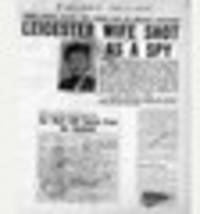 This is Leicestershire --
This is Leicestershire --This decade was ushered in with scenes of joyous celebration throughout the nation to mark the end of the Second World War in Europe.
Parties sprang up everywhere when it was announced on May 8 1945 that Germany had surrendered unconditionally.
The Mercury reported: "As soon as news of the surrender in Europe was heard in Leicester, Granby Street and other main thoroughfares soon assumed a victory air.
"Windows shot up and excited clerks and typists, beaming with joy, poured out flags, garlands and bunting.
"The most exuberant individual was a soldier home on leave who kissed his wife amid the approving glances of passers-by."
Hot off the press, the Mercury captured the mood of the nation by producing a special VE edition, while 10,000 people attending a thanksgiving service in Town Hall Square.
The war was to continue in the Pacific for another three months, before the atomic bombs dropped on Hiroshima and Nagasaki brought a swift end to Japanese resistance.
The war finally ended when they surrendered unconditionally on August 15, 1945.
Once again the locals dusted off the celebratory bunting and partied like it was 1945.
The Mercury reported: "There were lively scenes on the streets of Leicester all through the morning, groups of people, including many in the services, paraded, singing and demonstrating.
"Many of the streets, particularly in residential areas, were gaily decorated and preparations had been made for bonfires in quiet a number of districts."
The abundance of optimism and goodwill in the country, however, did not extend to Winston Churchill's government.
The now-revered wartime leader was ousted in the General Election in July, with Leicester playing its part.
The Mercury recorded how Leicester returned three Labour MPs, with the previous Tory majority of 11,472 in one city constituency – Leicester South – transformed into a Labour majority of 1,168.
A year later, in 1946, the Mercury broke the amazing wartime story of Elaine Plewman, of Stoneygate.
It told how she parachuted into occupied France, worked with the Resistance movement before being captured and executed.
Her courage saw her awarded the Croix De Guerre, with bronze star, posthumously. Her proud husband told how she carried out operations for six months before her capture by the dreaded Gestapo.
The Leicester lass was taken to the Dachau concentration camp and executed by firing squad on September 13, 1944 – a few months short of the war's end, and as the Allies liberated large swathes of the country in which she had proudly served.
The feelgood factor after the hostilities that scarred Europe saw the people delight in everyday pleasures, such as the return of league football.
In December 1946 the Mercury told how 7,000 fans were shut out as Leicester City took on Newcastle United.
Such was the clamour to see the game that the gate shad to be closed at 2.15pm – a full 45 minutes before kick off.
The 34,748 fans who did manage to get in saw a six- goal thriller, Newcastle winning 4-2.
A certain Prince Charles made his appearance into the world as the first Royal birth of note for decades.
The blue-blooded baby made his regal bow on November 14, 1948.
The Mercury said: "Reaction to the news in Leicester was spontaneous, flags being unfurled from the Town Hall and other public buildings and other premises throughout the city. The bells of Leicester Cathedral were rung for an hour between one and two o'clock today."
Optimism was the order of the day again when Leicester City reached the FA Cup final against Wolves, played on April 30, 1949.
But there was one famous Leicester son who was not happy about the scheduling.
The Mercury said: "One of the most disappointed men in London was Leicester stage and screen star Richard Attenborough. He had a ticket for Wembley but instead had to play in a matinee."
He was set for more disappointment when he came off stage to find City had lost 3-1.
Mal Griffiths netted for Leicester to pull it back to 2-1 at the start of the second half , but the day ended with England hero Billy Wright hoisting the cup aloft.
Nevertheless, the returning team were honoured by a massive 60,000 turn-out in their home city.
There was Royal news again in 1952 – but this time it was sombre, as King George VI died in his sleep on February 6.
The Mercury recorded: "People in Leicester were stunned by the news. Flags in public buildings were seen flying at half-mast."
The King was dead, but he was succeeded by a new Queen – his daughter.
On June 2, 1953, the coronation of Queen Elizabeth II was held at Westminster Abbey, but it did not see huge celebrations on the streets of Leicester.
The Mercury reported: "Television and chilly weather kept the gaily-decorated streets clear of crowds and meant a low attendance at a civic service on Town Hall Square." Reported by This is 15 hours ago.